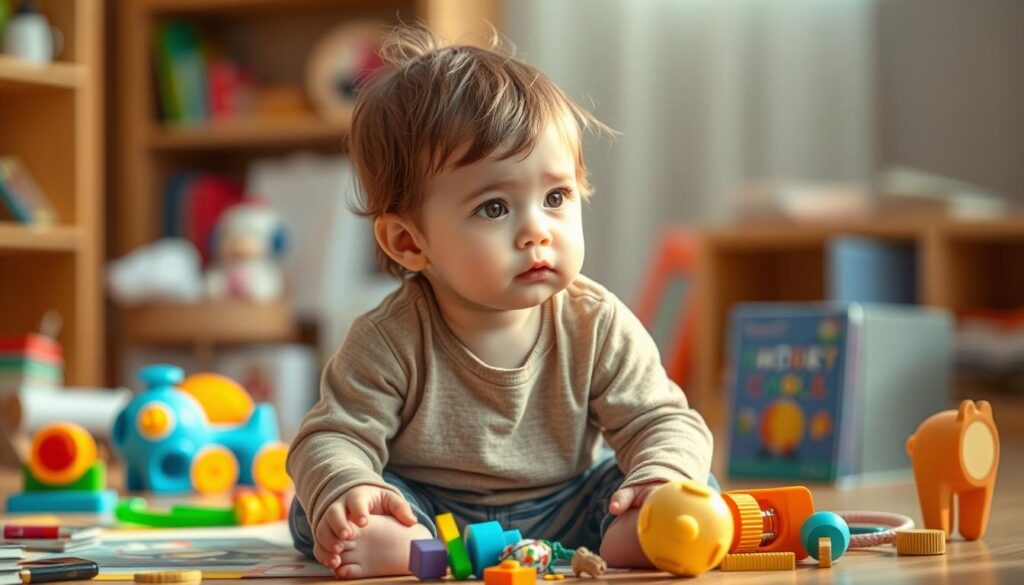As caregivers, it’s vital to focus on your child’s mental health as much as their physical health. The early years are key in shaping their mental health. With the right mental health strategies for kids, parents can help them grow strong and emotionally smart. It’s about creating a supportive space where kids can flourish emotionally and socially.
Key Takeaways
- Understand the integral role of mental health in a child’s development.
- Implement proactive mental health strategies for kids to foster resilience and emotional well-being.
- Maintain consistent and loving discipline that focuses on guiding, not punishing.
- Communicate openly about emotions and behaviors, reinforcing positive growth.
- Seek professional guidance to navigate complex mental health challenges.
Understanding Your Child’s Mental Health Needs

Children often show unique behaviors that might hint at mental health issues. It’s key for parents to know the difference between normal and serious signs. This knowledge helps in caring for a child’s mental health.
Recognizing the Signs of Mental Health Issues
Mental health signs in children can be hard to spot. They might look like mood swings, feeling sad all the time, or wanting to be alone. Spotting these signs early can really help a child’s future.
Importance of Early Intervention
Starting early with mental health intervention is vital. It helps solve problems right away and builds strong mental health for the future.
Differentiating Between Behavioral Challenges and Mental Health Concerns
It’s important to tell apart behavioral vs. mental health issues. Behavioral problems are often about how kids react to their surroundings. Mental health issues are deeper, coming from emotions or the brain. Knowing this helps parents find the right help.
| Issue Type | Common Indicators | Recommended Actions |
|---|---|---|
| Behavioral Challenges | Frequent tantrums, Defiance | Consistent boundaries, Positive reinforcement |
| Mental Health Concerns | Persistent sadness, Withdrawal | Consult healthcare professionals, Therapy |
Creating a Supportive Home Environment
Creating a supportive home for mental health is key for kids to grow emotionally and mentally. It starts with talking openly and doing daily things that help kids feel good. These activities also bring families closer together.
Open Communication: Establishing a Safe Space for Sharing
Open talk is the base of a supportive home for mental health. It’s important to let kids share their feelings without fear. This helps their mental and emotional health and makes family bonds stronger.
Promoting Positive Mental Health Through Daily Routines
Having positive routines for children is a big help for their mental health. Daily routines give kids a sense of safety and belonging. They help kids deal with stress better.
These routines, like eating together or reading before bed, make kids’ days predictable. They help kids feel secure in a world that can be unpredictable.
Importance of Family Bonding and Quality Time
The role of family bonding for child development is huge. Spending quality time together boosts emotional connections and supports kids’ mental health. It makes kids feel loved and understood, which is vital for a healthy family.
In short, making a caring home environment is key for kids’ mental health. It’s about talking openly, setting up good routines, and spending quality time together. Each part is important for kids to grow well and be resilient.
Strategies for Supporting Mental health chield
Creating strong mental health strategies for kids is key to helping them deal with life’s ups and downs. By teaching them good coping mechanisms for kids and resilience building in children, we help them stay emotionally and mentally strong. Here are some important ways to help kids handle stress, understand their feelings, and stay mentally fit.
- Educational Workshops: Schools and community centers can offer workshops on emotions, stress, and talking healthily.
- Role-Playing: It’s a fun way to teach kids how to handle different situations in a safe, guided setting.
- Art Therapy: It helps kids express and manage their feelings through art, great for those who struggle to talk about their feelings.
It’s vital for caregivers to offer ongoing support and understanding. Being patient lets kids grow at their own speed and gives them the emotional tools they need. This support boosts their confidence and improves their mental health, helping them face future challenges.
“Supporting the mental health of our children empowers them to thrive in all aspects of their lives, enriching their journey toward adulthood with strength and compassion.”
Every child is different, and knowing their unique needs is important for effective mental health support. Customizing these strategies for each child makes them more than just routines. They become steps towards greater emotional strength and a happier life.
Encouraging Healthy Social Interactions
In today’s digital world, it’s vital to focus on healthy social interactions. Parents play a key role in teaching their kids important social skills and empathy. They also help build positive friendships and manage social media use for their well-being.
Teaching Social Skills and Empathy
Teaching children to interact well with others is essential. Empathy is a big part of this, helping them understand and connect with others’ feelings. Activities like active listening, sharing, and taking turns are great ways to teach these skills.
Nurturing Positive Friendships
Helping kids make friends who are kind and supportive is important for their emotional growth. It’s about guiding them to find friends who share their values and interests. This way, they build a circle of friends who support and understand each other.
Monitoring Social Media Use and Online Interactions
It’s important to keep an eye on how kids use social media. Setting rules and talking about privacy and respect online is key. Checking in on their online activities should be done in a way that respects their privacy while keeping them safe.
| Age | Recommended Screen Time | Activities |
|---|---|---|
| 4-5 Years | 1 Hour/Day | Educational Apps, Video Calls with Family |
| 6-12 Years | 2 Hours/Day | School Assignments, Creative Games |
| 13-18 Years | 3 Hours/Day | Social Media, Research, Leisure |
Professional Support and Resources
Dealing with a child’s mental health needs a team effort. Sometimes, you need experts and community help. This part talks about when to get professional help, different therapies, and community resources.
When to Seek Help: Consulting Child Psychologists
If your child’s behavior, mood, or social skills change a lot, it’s time to see a child psychologist. Getting help early can really change things for the better. A child psychologist can figure out what’s going on and suggest the best treatments.
Navigating Therapy Options for Children
Therapy for kids is all about what they need. There’s cognitive-behavioral therapy, art therapy, and more. Knowing what’s out there helps parents make the best choices for their kids.
Finding Community Support and Resources
Community resources are key for kids’ mental health. They include support groups, workshops, and educational programs. These help kids stay mentally well over time.
| Resource Type | Description | Benefits |
|---|---|---|
| Support Groups | Groups bringing together families dealing with similar issues. | Sharing experiences, reducing stigma, mutual support. |
| Educational Programs | Programs aimed at educating children and parents about mental health. | Increased awareness, early detection skills, preventive measures. |
| Online Forums | Platforms for discussing day-to-day challenges and solutions. | Accessibility, anonymity, wide range of perspectives. |
Conclusion
Empowering child mental health is key for a bright future. We’ve looked at how parents and caregivers can help. This includes creating a supportive home, encouraging social skills, and getting professional help.
Helping a child’s mental health is more than just noticing when they’re upset. It’s about showing love, understanding, and support every day. By talking openly, setting positive routines, and building a caring community, parents can help their kids grow strong.
Mental health is just as important as physical health, and it needs attention from the start. Supporting our kids’ mental health is a lifelong journey. It requires learning, patience, and dedication. This way, we raise a generation that’s ready to handle life’s ups and downs with confidence and strength.




